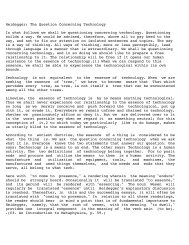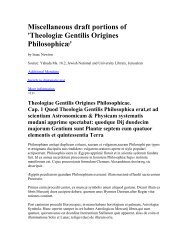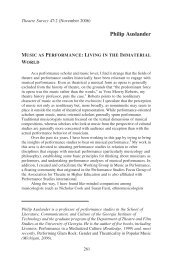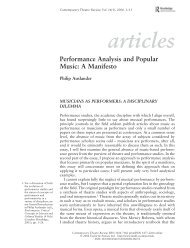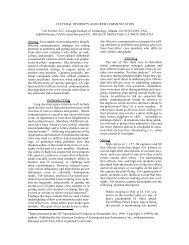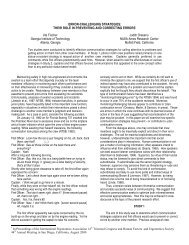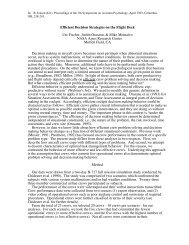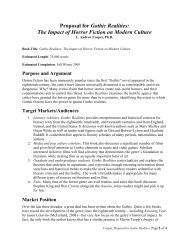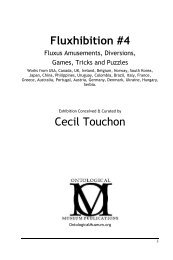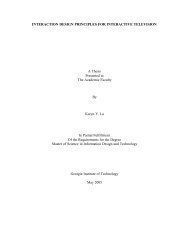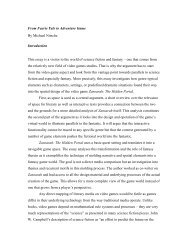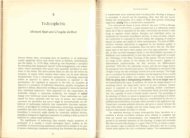william t. costello, sj - The School of Literature, Communication, and ...
william t. costello, sj - The School of Literature, Communication, and ...
william t. costello, sj - The School of Literature, Communication, and ...
Create successful ePaper yourself
Turn your PDF publications into a flip-book with our unique Google optimized e-Paper software.
THE FRAMEWORK OF SCHOLASTICISM 31<br />
(i) "<strong>The</strong> Protestant Church is the true Church <strong>of</strong> Christ"; (2)<br />
"<strong>The</strong>re is no external <strong>and</strong> infallible judge in matters <strong>of</strong> faith";<br />
<strong>and</strong> (3) "Faith cannot exist without charity, without which, how-<br />
ever, Faith is the adequate cause <strong>of</strong> justification." <strong>The</strong> Vice-<br />
Chancellor replied to the Jesuits that he had no power from His<br />
Majesty to give leave for a disputation, "... which might give<br />
them occasion <strong>of</strong> stay, <strong>and</strong> cause a meeting <strong>of</strong> the students . . ."<br />
But the wily Jesuits would not be put <strong>of</strong>f. That night "they writ<br />
divers copies <strong>of</strong> the questions, <strong>and</strong> fastened them to boughs, <strong>and</strong><br />
the next morning as they went to take boat for Wisbich, they<br />
threw them over Magdalen College walls . . ." <strong>The</strong> upshot was<br />
that at the King's coming to Cambridge the three questions, so<br />
curiously proposed, were disputed before him.<br />
Such was the disputation, a strictly stylized <strong>and</strong> technical exercise,<br />
which grew out <strong>of</strong> the dialectical character <strong>of</strong> medieval scholasticism.<br />
So natural was it to the age, that it had found its way<br />
into literature under the medieval form <strong>of</strong> the imaginatio, or<br />
imaginary disputation, 74 which might be described as a Platonic<br />
dialogue reduced to scholastic forms. <strong>The</strong> terms <strong>and</strong> practices <strong>of</strong><br />
the disputation crop up again <strong>and</strong> again in Elizabethan litera-<br />
ture, as, for example, in Greene's <strong>The</strong> Honorable History <strong>of</strong> Friar<br />
Bacon <strong>and</strong> Friar Bungay. In Scene 9, Bungay, crestfallen, has just<br />
admitted that he is no match for V<strong>and</strong>ermast. Friar Bacon enters:<br />
All hail to this royal company,<br />
That sit to hear <strong>and</strong> see this strange dispute!<br />
Bungay, how st<strong>and</strong>'st thou as a man amaz'd?<br />
What, hath the German acted more than thou?<br />
VANDERMAST: What art thou that question' 'st thus? 75<br />
Much <strong>of</strong> John Heywood's <strong>The</strong> Spider <strong>and</strong> the Fly (1562) is scho-<br />
lastic disputation. As for Shakespeare, the gravediggers' scene in<br />
Hamlet, V, i, is an expert literary adaptation <strong>of</strong> a scholastic prevarication,<br />
as is Touchstonian logic in As You Like It.<br />
THE DECLAMATION<br />
However dominant the disputation among scholastic exercises,<br />
there is a third exercise which was not dialectical, the declamation.<br />
Like the lecture <strong>and</strong> the disputation, the declamation was<br />
either public or private, held either in the university schools or<br />
in the colleges. <strong>The</strong> private declamation is the progenitor <strong>of</strong> the<br />
weekly essay now read to the supervisor<br />
in his rooms at both<br />
Cambridge <strong>and</strong> Oxford.



